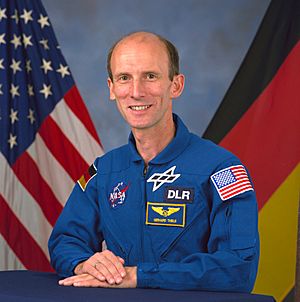Gerhard Thiele facts for kids
Quick facts for kids
Gerhard Thiele
|
|
|---|---|

Official NASA portrait
|
|
| Born |
Gerhard Paul Julius Thiele
September 2, 1953 |
| Nationality | German |
| Occupation | Physicist |
| Space career | |
| DFVLR/ESA astronaut | |
|
Time in space
|
11d 05h 39m |
| Selection | 1987 German Group |
| Missions | STS-99 |
|
Mission insignia
|
|
| Scientific career | |
| Fields | Environmental science |
| Thesis | Ein kinematisches Boxmodell zur Auswertung der Verteilung anthropogener Spurenstoffe in der Warmwassersphäre des Nordostatlantik (1985) |
Gerhard Paul Julius Thiele, born on September 2, 1953, is a German scientist who became an ESA astronaut. He is also the father of Insa Thiele-Eich, who is a candidate to become an astronaut herself.
Early Life and Education
Gerhard Thiele grew up in Heidenheim an der Brenz, Germany. He went to high school at Friedrich-Schiller-Gymnasium in Ludwigsburg. After school, he joined the German Navy. He worked on fast patrol boats, helping with operations and weapons.
In 1976, he started studying physics at the University of Munich and the University of Heidelberg. Physics is the study of how the universe works, from tiny atoms to giant galaxies. In 1985, he earned his doctorate degree in environmental science from Heidelberg. This means he became an expert in how humans affect the environment.
Becoming an Astronaut
After his studies, Gerhard Thiele worked as a researcher at Princeton University in the United States from 1986 to 1987.
In 1988, he was chosen to join the German astronaut team. He began his special training at the DLR. This is Germany's space agency. In 1990, he was picked as a backup astronaut for a German space mission called D-2 (STS-55). This mission used a special laboratory in space called a spacelab.
During the D-2 mission in April 1993, Gerhard Thiele helped from the ground. He worked at the Payload Operations Control Center in Oberpfaffenhofen, Germany. He was the alternate payload specialist, meaning he was ready to take over if needed.
In 1996, the German Space Agency selected him for more training. He went to NASA in the United States to learn how to be a Space Shuttle Mission Specialist. In August 1998, he officially joined the European Space Agency (ESA). The German astronaut team became part of ESA.
His Space Mission
In 2000, Gerhard Thiele finally went to space! This was his only spaceflight. He flew on the STS-99 mission, which was called the Shuttle Radar Topography Mission. On this mission, the Space Shuttle used special radar to create detailed maps of Earth's surface.
After Spaceflight
From 2003 to 2004, Gerhard Thiele trained in Russia. He was the backup astronaut for André Kuipers on the Soyuz TMA-4 mission. This meant he was ready to fly if André Kuipers couldn't.
He retired from being an active astronaut with the European Astronaut Corps in October 2005.
Later, in 2010, he became a Resident Fellow at the European Space Policy Institute in Vienna, Austria. This institute studies space policy.
From July 1, 2013, Gerhard Thiele took on a new role at ESA. He became the head of the Human Spaceflight and Operations Strategic Planning and Outreach office. This office helps plan future human space missions and shares information about them with the public.
 | Charles R. Drew |
 | Benjamin Banneker |
 | Jane C. Wright |
 | Roger Arliner Young |

